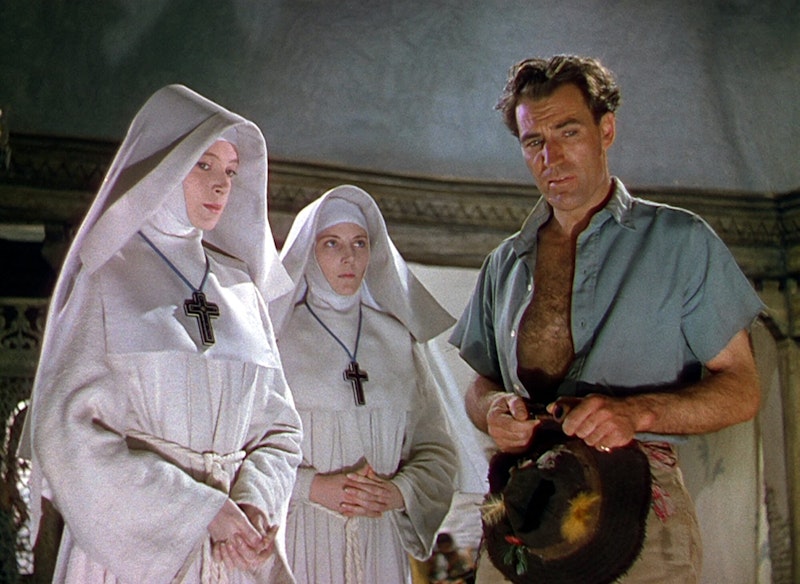Michael Powell and Emeric Pressburger made a fine directorial pair specializing in large, Technicolor productions. They had a unique talent (along with the cinematographer, Jack Cardiff) to tease out a specific atmosphere and feeling by using bold colors and uneasy shadows. Their 1947 film, Black Narcissus, is an example of how far art direction and external elements can go to convey the forbidden desires and nightmares that occur.
In Black Narcissus, a group of Anglican nuns decide to open a convent in the Himalayas. They do so by an invitation of a general, and the objective is to start a hospital and a school for the local children. Deborah Kerr plays Sister Clodagh, a young nun who’s chosen to be the Sister Superior of the newly-founded convent. She and a few other nuns make the journey to the Himalayas, expecting to do God’s work.
Even from the very beginning, life in the convent carries with it discomfort. The building they’ve chosen to convert into a convent is high above the ground, in the mountains, where wind perpetually blows. The interior of the palace is adorned with various images that carry erotic suggestions. This is unsurprising since the palace used to be the harem. Sister Clodagh appears to disregard this and tries to maintain her holy composure.
One of the local men is Mr. Dean—a British man in the midst of a strange land. Dean’s irreverent although he does respect Sister Clodagh, even if he’s harsh with her. Dean couldn’t care less about God and religion, and this is shown in his attitude toward the entire enterprise.
Instead of bringing the Christian faith to the people, the nuns find themselves overwhelmed with the external world of the palace and the mountains. Suddenly, they all begin to think of their lives before they became nuns. Sister Clodagh reflects on her romance with a man, who was more interested in leaving Ireland for America than marrying her. Sister Phillipa forgets to plant vegetables in the garden. She begins to lose herself in the landscape and instead of planting vegetables, she plants flowers. Her mind wanders upon seeing the horizon, and she’s not sure why she should plant potatoes at all.
Sister Ruth is practically possessed by the devil. She’s already suffering from a mental malady, but the world of sensual delights merely continues the violent and erotic path that she’s chosen to take. As her obsession with Dean grows, so does her hatred of Sister Clodagh. She takes off the nun’s habit and wears a scarlet dress along with bright red lipstick.
The fight between ascetic rationality and erotic madness is at the center of Black Narcissus. Even Sister Clodagh, who takes her responsibility as the Sister Superior very seriously begins to have doubts about her vocation. She moves between hatred and love for Dean, and isn’t sure why. Dean destroys everything that’s sacred and brings in the profanation of the spirit.
The nuns are living in a dream world, high above the ground. It’s as if they’ve entered through the gates of life and death. They quickly lose their will, like they’re captured and held prisoners in the mountains. Whose women are they? God seems to be absent because even their prayers become superficial and exhausting.
The erotic element in the film is always present, but Powell and Pressburger choose a non-traditional route as a way of dealing with the forbidden desires of the religious. In fact, the faith is hardly present. Sister Clodagh prays but she’s quickly overtaken by the scents and the wind. She’s not sure what constitutes reality, yet she’s holding onto some ridiculous notion that a convent in such an unearthly place can survive.
In dreams, anything is possible, but so are nightmares. The dream becomes a nightmare when Sister Ruth tries to murder Sister Clodagh. The sweet scent of black narcissus and of the flowers, the vibrant colors, and the mountains are divorced from the idea that God created such a world. Such places are illusions of reality where the profane nature kills off the human and godly hand. To paraphrase Werner Herzog, this kind of nature is a place where fornication reigns supreme.
It’s a place that God never finished creating and perhaps because of this, it evades the order the nuns are trying to bring. The dream and the nightmare of the palace, the sacred and the profane, the human and the nature—all of these primeval elements continue to exist and breathe an uneasy life into the halls of the palace. The erotic and chaotic consciousness continues its undulating path into the windy mountains that cares only for its specific kind of order.

